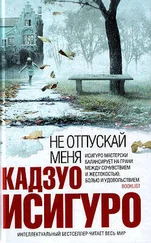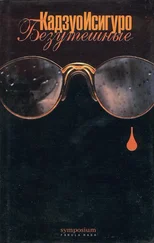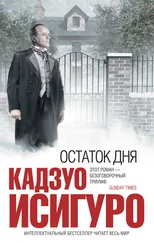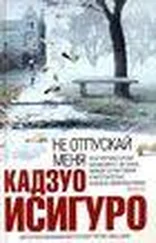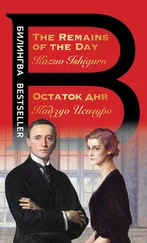They entered the flow of passers-by, going in the direction of the second Tow-Away Zone sign, Josie with her cautious walk, her mother’s arm around her as they went. Once, before they left my view, Josie looked back, and even though she had to disturb the rhythm of their walk, gave me one last wave.
—
It was later that same afternoon, Rosa said: ‘Klara, isn’t it funny? I always thought we’d see so many AFs out there once we got in the window. All the ones who’d found homes already. But there aren’t so many. I wonder where they are.’
This was one of the great things about Rosa. She could fail to notice so much, and even when I pointed something out to her, she’d still not see what was special or interesting about it. Yet every now and then she’d make an observation like this one. As soon as she said what she did, I realized that I too had expected to see many more AFs from the window, walking happily with their children, even going about their business by themselves, and that even if I hadn’t acknowledged it to myself, I too had been surprised and a little disappointed.
‘You’re right,’ I said, looking from right to left. ‘Just now, among all these passers-by, there isn’t a single AF.’
‘Isn’t that one over there? Going past the Fire Escapes Building?’
We both looked carefully, then shook our heads at the same time.
Though she’d been the one to bring up this question about the AFs outside, it was typical that she soon lost all interest in it. By the time I finally spotted a teenage boy and his AF walking past the juice stand on the RPO Building side, she barely looked their way.
But I went on thinking about what Rosa had said, and whenever an AF did go by, I made sure to watch closely. And before long, I noticed a curious thing: there were always more AFs to be seen on the RPO Building side than on ours. And often, if an AF did happen to be coming towards us on our side, walking with a child past the second Tow-Away Zone sign, they would then use the crossing and not come past our store. When AFs did go by us they almost always acted oddly, speeding up their walk and keeping their faces turned away. I wondered then if perhaps we – the whole store – were an embarrassment to them. I wondered if Rosa and I, once we’d found our homes, would feel an awkwardness to be reminded that we hadn’t always lived with our children, but in a store. However much I tried, though, I couldn’t imagine either Rosa or me ever feeling that way about the store, about Manager and the other AFs.
Then as I continued to watch the outside, another possibility came to me: that the AFs weren’t embarrassed, but were afraid. They were afraid because we were new models, and they feared that before long their children would decide it was time to have them thrown away, to be replaced by AFs like us. That was why they shuffled by so awkwardly, refusing to look our way. And that was why so few AFs could be seen from our window. For all we knew, the next street – the one behind the RPO Building – was crowded with them. For all we knew, the AFs outside did all they could to take any route other than one that would bring them past our store, because the last thing they wanted was for their children to see us and come to the window.
I shared none of these thoughts with Rosa. Instead, whenever we spotted an AF out there I made a point of wondering aloud if they were happy with their child and with their home, and this always pleased and excited Rosa. She took it up as a kind of game, pointing and saying: ‘Look, over there! Do you see, Klara? That boy just loves his AF! Oh, look at the way they’re laughing together!’
And sure enough, there were plenty of pairs that looked happy with each other. But Rosa missed so many signals. She would often exclaim delightedly at a pair going by, and I would look and realize that even though a girl was smiling at her AF, she was in fact angry with him, and was perhaps at that very moment thinking cruel thoughts about him. I noticed such things all the time, but said nothing and let Rosa go on believing what she did.
Once, on the morning of our fifth day in the window, I saw two taxis, over on the RPO Building side, moving slowly and so close together someone new might have supposed they were a single vehicle – a kind of double taxi. Then the one in front became slightly faster and a gap appeared, and I saw through that gap, on the far sidewalk, a girl of fourteen, wearing a cartoon shirt, walking in the direction of the crossing. She was without adults or an AF but seemed confident and a little impatient, and because she was walking at the same speed as the taxis, I was able to keep watching her through the gap for some time. Then the gap between the taxis grew wider still, and I saw she was with an AF after all – a boy AF – who was walking three paces behind. And I could see, even in that small instant, that he hadn’t lagged behind by chance; that this was how the girl had decided they would always walk – she in front and he a few steps behind. The boy AF had accepted this, even though other passers-by would see and conclude he wasn’t loved by the girl. And I could see the weariness in the boy AF’s walk, and wondered what it might be like to have found a home and yet to know that your child didn’t want you. Until I saw this pair it hadn’t occurred to me an AF could be with a child who despised him and wanted him gone, and that they could nevertheless carry on together. Then the front taxi slowed because of the crossing, and the one behind drew up and I couldn’t see them any more. I kept watching to see if they would come over at the crossing, but they weren’t in the crossing crowd, and I could no longer see the other side because of all the other taxis.
—
I wouldn’t have wanted anyone other than Rosa beside me in the window during those days, but our time there did bring out the differences in our attitudes. It wasn’t really that I was more eager to learn about the outside than Rosa: she was, in her own way, excited and observant, and as anxious as I was to prepare herself to be as kind and helpful an AF as possible. But the more I watched, the more I wanted to learn, and unlike Rosa, I became puzzled, then increasingly fascinated by the more mysterious emotions passers-by would display in front of us. I realized that if I didn’t understand at least some of these mysterious things, then when the time came, I’d never be able to help my child as well as I should. So I began to seek out – on the sidewalks, inside the passing taxis, amidst the crowds waiting at the crossing – the sort of behavior about which I needed to learn.
At first I wanted Rosa to do as I was, but soon saw this was pointless. Once, on our third window day, when the Sun had already gone behind the RPO Building, two taxis stopped on our side, the drivers got out and began to fight each other. This wasn’t the first time we’d witnessed a fight: when we were still quite new, we’d gathered at the window to see as best we could three policemen fighting with Beggar Man and his dog in front of the blank doorway. But that hadn’t been an angry fight, and Manager had later explained how the policemen had been worried about Beggar Man because he’d become drunk and they’d only been trying to help him. But the two taxi drivers weren’t like the policemen. They fought as though the most important thing was to damage each other as much as possible. Their faces were twisted into horrible shapes, so that someone new might not even have realized they were people at all, and all the time they were punching each other, they shouted out cruel words. The passers-by were at first so shocked they stood back, but then some office workers and a runner stopped them from fighting any more. And though one had blood on his face, they each got back into their taxis, and everything went back to the way it was before. I even noticed, a moment later, the two taxis – the ones whose drivers had just been fighting – waiting patiently, one in front of the other, in the same traffic lane for the lights to change.
Читать дальше

